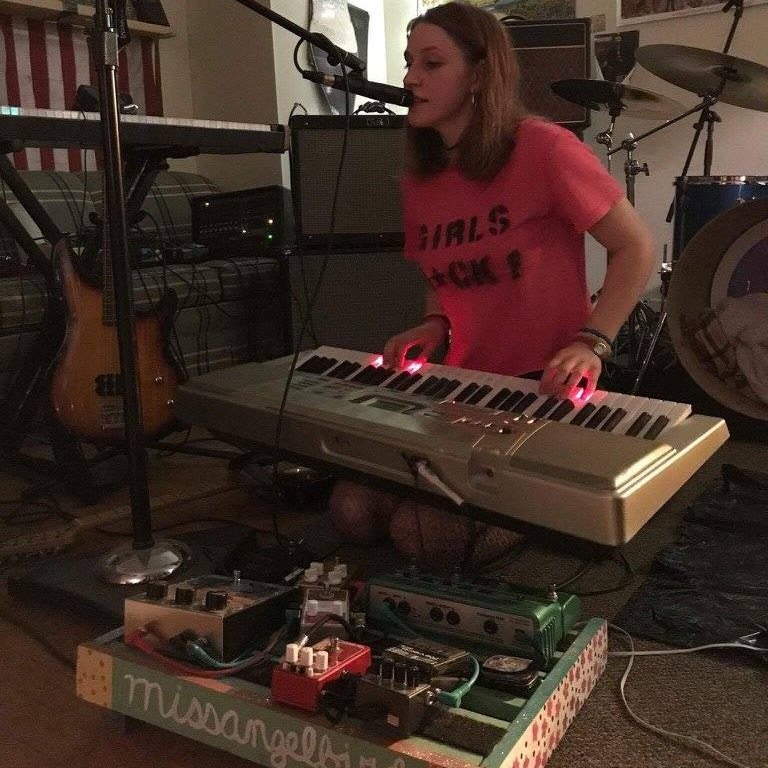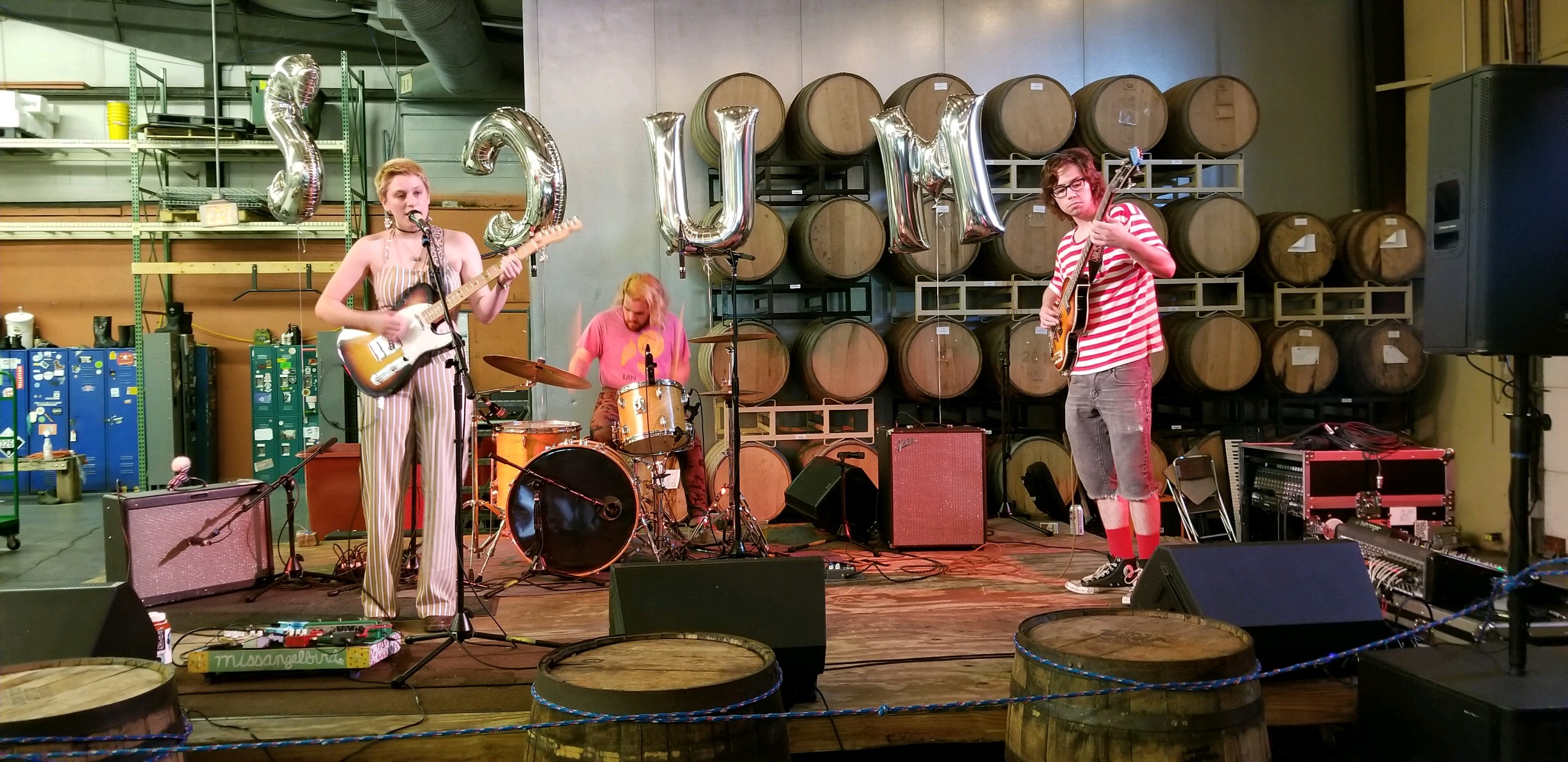How Tomorrow Sounds: Social Consciousness From Missangelbird
There are a lot of ways to get Erica Lashley to smile.
You could tell her how the jazzy chord extensions, heavy rock beats, and distorted guitars in her songs “Haircut” and “Beach House Pt. 2” take you back to the place where Jeff Buckley left off in the late ‘90s, blurring the lines even further between the fast, hard simplicity of punk rock music and the laid back, complicated changes you might hear in a downtown jazz club. You could ask her about her role in one of the numerous Richmond bands she contributes her talents to — her lead guitar riffs with Minor Poet, or her bass playing and harmonies in the up-and-coming indie-alternative project, Hotspit, or maybe even about her fiddle playing as a member of Attack Art, Hurt Art. Maybe you ask her about the origin of her alter ego, Missangelbird, and hear a smile sneak into her voice as she tells you about how the project title comes from a name her grandmother addressed her as when she was young.
No matter how you decide to approach conversation with Erica Lashley, it is almost certain that you’ll catch at least a hint of her smile if the topic is music. If Lashley’s passion for writing and performance isn’t made clear through the fact that, since graduating from James Madison University in May and making a permanent move from Harrisonburg to Richmond, she’s stayed incredibly busy in the local scene, becoming a musician that, it seems as though, everyone wants to collaborate with after first listen –then her passion is made clear when you hear the enthusiasm with which she talks about the many sound experiments she’s been a part of, and the difference she’s been able to make in her community as a result of her music experience.
In August of 2017, Lashley organized, fundraised, and counseled for Harrisonburg’s Girls Rock Camp, a camp aimed at teaching young girls the basics of rock music instrumentation and allowing young women to collaborate and form bands under the guidance of more experienced professionals, like Lashley herself. Lashley capped off her final semester at JMU with a 60-paged thesis, in which she outlined the importance of giving girls a vehicle through which they might access their “voice,” and subvert the social ideologies that often lead young women to devalue their skills and talents in favor of focusing on bodily attributes and physical traits as best features. Lashley hoped for the Girls Rock Camp to be one of the first steps in “a lifelong effort to empower women and girls around [her].” As a friend and frequent collaborator, I had the pleasure to sit down with Lashley and talk about music, gender, and the Richmond scene.

Girls Rock targeted girls aged 8-18. I wanted to talk to you a bit about your music experience around that time. Was it already clear at that age that the music industry was very gendered or is that something you saw in retrospect?
A lot of my campers were eight year olds, eight to ten, so for me during that time, my music experience was in church, pretty much, only. I started singing in church around that time and it was a lot of women, but then, as I got older, I joined orchestra in middle school and that was a mix of people. I didn’t really see any kind of gender roles or issues or anything like that. Once I got to high school, I noticed that the people who were more into the pop and rock band kind of stuff did tend to be guys, and I would play music on my own a lot, kind of just with people collaborating or soloing in the stairwells of my high school, but all of the “band bands” that were at my high school were pretty much all dudes, and I really wanted to be in a band and I just couldn’t find a way in. I don’t know if that answers the question.
Was it hard to say, “Hey, I play guitar,” and have people take you seriously, or was it more of a social discomfort?
I think it was more of a social thing, just because I wasn’t really close friends with a lot of people that played music and the people who played music together had been doing it since middle school, so it was like, the members of Manatree that were playing together and stuff and I couldn’t really get in with them as easily, just because they were so tight knit and had been doing their thing for a while, and I couldn’t really find other people that were into the same thing. Yet.
I guess Girls Rock was kind of a way to get young girls together at an early age, so they don’t have to deal with that problem?
Yeah!
I read your thesis on Girls Rock, and you mention how music helped you access your “voice.” I wanted to talk to you about that because that’s something I think about a lot as a black writer and entertainer — the intersection between culture and artistic output and how artists influence culture and culture influences artists. It’s a sort of weird back and forth. Did music change the way you think about femininity or does gender change the way you approach your music? Is that something you’re thinking about?
Honestly, not really. I think that sometimes [when listening to] a female artist like Frankie Cosmos or Wye Oak or St. Vincent, sometimes lyrically, they’ll reach me a little bit more or maybe I’m subconsciously more open to what they’re saying at times, because I’m like, “Oh, this is Frankie Cosmos, I’m totally going to relate to this,” but in terms of actual musical sounds, I don’t really think about that.
So you don’t really feel a pressure to write a certain way? I don’t know if there’s ever any culture pressure, like when you’re writing a song, if you’re ever thinking, “Young girls will hear this?”
I do kind of think about that, and I also kind of have the reverse of that, which… I can’t think of the right way to word this, because I don’t want to make it sound like I’m trying to shit on certain types of music, but I kind of do find myself trying to shy away from just strumming chords and using my guitar as a rhythm box because it kind of feels like that will turn people off, because people see so many girls do that. And especially because I feel like my strengths are more on the guitar rather than songwriting, and so, like, a lot of girls who do more simple stuff on guitar will have a more powerful song, and I think I sometimes feel more connected to the musical part of it, and finding a really beautifully voiced chord, or like, a cool chord progression that somehow speaks to me emotionally.
I know that there’s a stereotype in the industry that “girls are singers.” You play multiple instruments, you do sound, you’re a bandleader — you do all of these different things. Is that kind of something you think about in relation to what you were just saying?
Yeah, it used to bother me, kind of, that people would assume I’m a singer, or expect women to be singers and, not so much, play the instrument or be the sound person, but… I don’t know why I think this is going to answer this question, but I think women who can kind of play an instrument, if they just kind of acted like they knew what they were doing more, they would be a lot better [laughs]. Because I had a lot of insecurities with playing guitar and stuff when I was first starting out and first starting to play with people and jam, and I realized that the people I was playing with, they weren’t all knowing. For some reason, I was so timid and thought that everyone knew way more than me, but in reality, everyone approaches the instrument differently and has a different way of learning, like, some people look at the dots on the guitar and some people think about the actual note name, and, I don’t know — you just do what you got to do, I guess.
I don’t know if you paid attention to the whole Lauryn Hill-Robert Glasper thing that went down?
I vaguely heard about it, I think, from either you or Brendan [Callan, of Venus Milo], or maybe both [laughs].
She talked a bit about what it takes to lead a band as a woman, and one of the things she responded to that Robert Glasper was critical of was the fact that she made her band refer to her as “Miss Lauryn Hill.” Obviously, I know you don’t do that, as I’ve played with you. As someone who leads a band and works mainly with male musicians, do you have to approach rehearsals and performances differently? Do you think about that when you’re leading your band?
I do a little bit. When I first started Missangelbird, and it was just a duo, I was still really nervous about how to explain my songs to someone else and tell them what I wanted, because at that point, I didn’t really know anything about drums. I didn’t know how they were supposed to sound and I think that the people that I always play with, or the people that I choose to play with me are super respectful and nice people, who are really open and won’t dominate or be annoying and will know how to ask me what I want. I don’t know if that makes sense.
When I first started playing with Etha [Wilso, of Lilac Sun, Missangelbird, Slow Clover], he was such a good drummer, he knows how to follow and make [the song] sound good, but he would still make sure [the part was what I wanted] at the same time, in a not condescending way. I also read this interview with [Jenn Wasner] from Wye Oak a while back. She was talking about being a bandleader too, and how one day, she kind of had to say to herself, “you can do this,” like, “you know what you’re doing,” and sometimes I have to remind myself of that too, I’m like, “you know what you’re doing, you can do this,” because sometimes I’ll feel really clueless in the moment, but I don’t know… I’ve just had pretty good experiences with [being a bandleader].
I know how complicated it can be as a bandleader, because, at least for me, I always want musicians that know way more about their instruments than I know. I pretty much want to be the worst player in my band, but then simultaneously, I have to lead the band so that takes a level of demanding respect and being able to kind of say to someone who’s very talented, “I don’t like that,” or “I want something different.” It’s taking me a long time to learn to just say, “This is what I want.”
Yeah, and I also think — I like to play with musicians who have different ideas, and moving to Richmond and playing, basically, with different groups as Missangelbird, it’s been cool to see how different people approach the same songs. But I know what you mean. It’s kind of hard to be like, “wait, actually, could you not do that,” and make the final decision, but like, if you’re the bandleader, that’s what you do.
Every time I take my songs to a new band, I get a different song so I’m looking for musicians who I can trust with these songs.
Yeah, and that’s another thing about the “Miss Lauryn Hill,” thing. While I see her reasoning behind that, and I think it’s kind of funny too [smiles], for me, at least personally, if I’m going to have a trusting relationship with my band, I want them to be able to be like “Hey, Lauryn” [laughs]. I don’t know. I don’t want them to have to feel like they have to be formal. It should be a casual and trusting thing.

So you gigged regularly this summer. I saw you on all kinds of Facebook events and I played with you a few times — are there changes you’d like to see in the Richmond music scene as far as gender equality and fairness goes?
I think it’s really cool, the amount of bands lead by women right now. That’s really exciting and awesome. I was thinking about this question the most, because I don’t know how to really word it. I know there are still some situations — there’s one sound engineer I know who’s a trans woman that feels, I guess, kind of disrespected and awkward when she’s doing sound for people because they’ll still kind of be like, “Yeah, thanks man,” which is a casual thing musicians say, but it also feels like they’re not really paying attention or being respectful.
I think that we could bring a little more awareness to that. Also, while there are a lot of female front women right now, part of the reason I wanted to do Girls Rock, and part of the reason I’m playing in so many bands, is [because] I also just love to see women rhythm section players and lead guitarists and stuff. It just kind of seems odd that it’s either all or nothing, in a way, it’s like ‘she’s the leader of the band,’ or she’s like a background singer, or not in the band. I don’t really know how to describe it.
Is there any other topic you want to hit?
Not really. [Smiles] I was excited about your question about “Bullshit” though…
Oh yeah, I’ve always noticed playing with you, the chorus of your song “Bullshit” ends with the line, “I’ll be the better man,” and I always wondered if that was artistic license or a thought out writing decision?
Yeah, it’s kind of both, because I refer to myself as a man in another song, I forget what song it is… oh, it’s the new one, “Rio Vista,” I say something like, “let me be your man.” Sometimes, I think when I’m writing those songs like that, I’m kind of self-reflecting on my more masculine qualities in a way, but at the same time, the lyric fit and I was using those lines in kind of a cliché, ironic way, like trying to use a cliché in a different way. It just kind of sings better and it makes me think more like, “I’ll be the better man.” In a way, I’m also trying to remove gender from [the song] by saying “I’ll be the better human.” So, [smiles] I have a lot of complicated thoughts about it.
Are those the only two of your songs that have that quality?
There’s also “Lemon Love.” That song is not about a girl that I was in love with, but I act like I’m singing it to a girl. I’m not really sure [about] the reason for that still. I didn’t like the way “boy” sounded when I was singing it, and also, for some reason, the word “girl” kind of fit with the situation more to me.
I know that you’re planning to release your debut full-length solo record soon. Are there any other ways your experience with Girls Rock and research on gender influenced the upcoming album?
To be honest, I’m not really thinking about gender and Girls Rock too much with the upcoming album. My experience and research has been a big motivator for me to continue to make music, perform, and to complete the album, though, because I want to set an example for other women and girls. Collaboration when making music is really important, but it was also really important to me to keep the recordings of the songs authentic and true to my vision. I just want others to know that they can do it too!
On October 26th, Erica Lashley will release the first single, “Ghost,” off her upcoming debut album, A Distorted Guitar Is Now A Necessity To Be Free,” followed shortly by the second single, “Bullshit,” set to be released sometime during the first week of November.
The full project will be available on January 11, 2019, but until then, you can follow her on Facebook and Twitter, or in any of the previously mentioned bands she performs with.
Lashley performs next alongside Minor Poet on October 19th at Hardywood with local band Blush Face and Atlanta’s Easter Island also performing. For more information on the show, click here.



